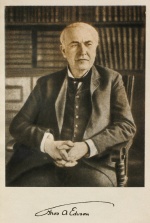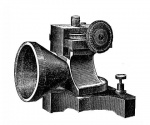Thomas Alva Edison: Difference between revisions
No edit summary |
Pablo Sender (talk | contribs) No edit summary |
||
| Line 1: | Line 1: | ||
{{Template:Article needs expansion}} | {{Template:Article needs expansion}} | ||
[[File:Thomas A. Edison.jpg|right|150px|thumb|Edison in 1915]] | |||
<br> | |||
<br> | |||
<br> | |||
'''Thomas Alva Edison''' (February 11, 1847 – October 18, 1931) was an American inventor and businessman. He was the fourth most prolific inventor in history, holding 1,093 US patents in his name, as well as many patents in the United Kingdom, France, and Germany. | |||
He was a member of the [[Theosophical Society]] in New Jersey, and according to [[Koot Hoomi|Master K.H.]] he was "a good deal protected by [[Morya|M.]]".<ref>Vicente Hao Chin, Jr., ''The Mahatma Letters to A.P. Sinnett in chronological sequence'' No. 93b (Quezon City: Theosophical Publishing House, 1993), 325.</ref> | |||
<br> | |||
<br> | |||
<br> | |||
<br> | |||
<br> | |||
<br> | |||
<br> | |||
<br> | |||
== Tasimeter == | |||
[[File:Tasimeter.jpg|left|150px|thumb|Edison's Tasimeter]] | |||
When discussing with [[Alfred Percy Sinnett|A. P. Sinnett]] about undiscovered planets in the Solar System, [[Koot Hoomi|Master K.H.]] mentions one of Edison's invention, the tasimeter, which was designed to measure infrared radiation: | |||
<blockquote>Edison's tasimeter adjusted to its utmost degree of sensitiveness and attached to a large telescope may be of great use when perfected. When so attached the "tasimeter" will afford the possibility not only to measure the heat of the remotest of visible stars, but to detect by their invisible radiations stars that are unseen and otherwise undetectable, hence planets also. . . . | |||
His <u>tasimeter</u>, he says, "is affected by a wider range of etheric undulations than the eye can take cognizance of." Science will <u>hear</u> sounds from certain planets before she <u>sees</u> them. This is a <u>prophecy</u>. Unfortunately I am not a Planet, — not even a "planetary." Otherwise I would advise you to get a <u>tasimeter</u> from him and thus avoid me the trouble of writing to you.<ref>Vicente Hao Chin, Jr., ''The Mahatma Letters to A.P. Sinnett in chronological sequence'' No. 93b (Quezon City: Theosophical Publishing House, 1993), 325.</ref></blockquote> | |||
== Notes == | |||
<references/> | |||
[[Category:Nationality American|Edison, Thomas]] | [[Category:Nationality American|Edison, Thomas]] | ||
Revision as of 15:38, 31 October 2013

Thomas Alva Edison (February 11, 1847 – October 18, 1931) was an American inventor and businessman. He was the fourth most prolific inventor in history, holding 1,093 US patents in his name, as well as many patents in the United Kingdom, France, and Germany.
He was a member of the Theosophical Society in New Jersey, and according to Master K.H. he was "a good deal protected by M.".[1]
Tasimeter
When discussing with A. P. Sinnett about undiscovered planets in the Solar System, Master K.H. mentions one of Edison's invention, the tasimeter, which was designed to measure infrared radiation:
Edison's tasimeter adjusted to its utmost degree of sensitiveness and attached to a large telescope may be of great use when perfected. When so attached the "tasimeter" will afford the possibility not only to measure the heat of the remotest of visible stars, but to detect by their invisible radiations stars that are unseen and otherwise undetectable, hence planets also. . . . His tasimeter, he says, "is affected by a wider range of etheric undulations than the eye can take cognizance of." Science will hear sounds from certain planets before she sees them. This is a prophecy. Unfortunately I am not a Planet, — not even a "planetary." Otherwise I would advise you to get a tasimeter from him and thus avoid me the trouble of writing to you.[2]
Notes
- ↑ Vicente Hao Chin, Jr., The Mahatma Letters to A.P. Sinnett in chronological sequence No. 93b (Quezon City: Theosophical Publishing House, 1993), 325.
- ↑ Vicente Hao Chin, Jr., The Mahatma Letters to A.P. Sinnett in chronological sequence No. 93b (Quezon City: Theosophical Publishing House, 1993), 325.

